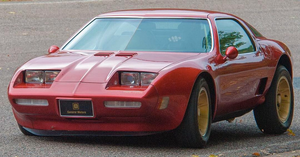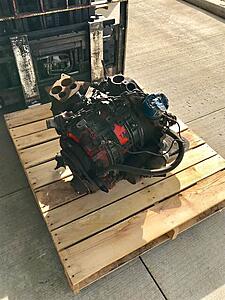GM XP897GT Corvette
#1
GM XP897GT Corvette
I just saw this come across a friends FB page and had to share it...


Itís taken thirty years to find it , but today it starts its journey to England. Yes, itís a GMRCE rotary, produced at GMís Hydramatic Division plant in Toledo Ohio in 1973 . According to leading Corvette historian Karl Ludvigsen, it an RC2-266, 2 rotors and 266 cubic inches nominal displacement . Each ďcombustion chamberĒ is 1,090 cc. On the presently installed Mazda 13b engine , I believe each ďcombustion chamberĒ is 654cc. So , Mazda and rotary engine experts please correct me, this is a bigger engine. Power output was 180 bhp at 6,100 rpm. Big thanks to Scott Kohn at Corvette Central for his help in the final transaction logistics. Eventually destined to power my Corvette XP987-GT, and replace the Mazda RX7 rotary we installed in the last century!
...and a video of his car with the current motor:


Itís taken thirty years to find it , but today it starts its journey to England. Yes, itís a GMRCE rotary, produced at GMís Hydramatic Division plant in Toledo Ohio in 1973 . According to leading Corvette historian Karl Ludvigsen, it an RC2-266, 2 rotors and 266 cubic inches nominal displacement . Each ďcombustion chamberĒ is 1,090 cc. On the presently installed Mazda 13b engine , I believe each ďcombustion chamberĒ is 654cc. So , Mazda and rotary engine experts please correct me, this is a bigger engine. Power output was 180 bhp at 6,100 rpm. Big thanks to Scott Kohn at Corvette Central for his help in the final transaction logistics. Eventually destined to power my Corvette XP987-GT, and replace the Mazda RX7 rotary we installed in the last century!
...and a video of his car with the current motor:
Last edited by MattGold; 10-25-17 at 11:51 PM.
The following 3 users liked this post by MattGold:
#2
So I met a guy who works at GM, an old timer who has access to the old archives. The old reports said they canned the rotary program right before it went to production because the apex seal wear was simply awful. Like terrible, 30k miles and it's dead. They first thought it was an assembly or manufacturing problem.
later on they realized it was the displacement was the root cause of the seal failure. The apex seal travels much more distance per rev. So the wear is accelerated. Of course thst is with old 1970s materials but still...
the 2 rotor was supposed to go in the Chevy Monza and the Corvette would get twice the displacement for a 4 rotor. Since the Monza engine never worked, they canned the Corvette program.
your friends project is probably doomed. I doubt he can re engineer something in his garage that GM couldn't.
later on they realized it was the displacement was the root cause of the seal failure. The apex seal travels much more distance per rev. So the wear is accelerated. Of course thst is with old 1970s materials but still...
the 2 rotor was supposed to go in the Chevy Monza and the Corvette would get twice the displacement for a 4 rotor. Since the Monza engine never worked, they canned the Corvette program.
your friends project is probably doomed. I doubt he can re engineer something in his garage that GM couldn't.
Last edited by arghx; 10-26-17 at 08:05 PM.
#3
The car is owned by Tom Falconer, a friend of mine on Facebook, and a fellow member of the Corvette club. He is an amazing person, car collector, and author. Two days ago he had posted this on his timeline and I shared it to the 1st generation group. Glad to see it made its way here on the forum.I have a few more pics of his car if anyone would like to see them I'd be happy to post them here. Currently the engine is on its way to him from the U.S. Tom plans on making what he doesn't have to get the engine up and running. Currently the car is powered by a 13B.
#5
So I met a guy who works at GM, an old timer who has access to the old archives. The old reports said they canned the rotary program right before it went to production because the apex seal wear was simply awful. Like terrible, 30k miles and it's dead. They first thought it was an assembly or manufacturing problem.
later on they realized it was the displacement was the root cause of the seal failure. The apex seal travels much more distance per rev. So the wear is accelerated. Of course thst is with old 1970s materials but still...
the 2 rotor was supposed to go in the Chevy Monza and the Corvette would get twice the displacement for a 4 rotor. Since the Monza engine never worked, they canned the Corvette program.
your friends project is probably doomed. I doubt he can re engineer something in his garage that GM couldn't.
later on they realized it was the displacement was the root cause of the seal failure. The apex seal travels much more distance per rev. So the wear is accelerated. Of course thst is with old 1970s materials but still...
the 2 rotor was supposed to go in the Chevy Monza and the Corvette would get twice the displacement for a 4 rotor. Since the Monza engine never worked, they canned the Corvette program.
your friends project is probably doomed. I doubt he can re engineer something in his garage that GM couldn't.
#6
F'n Newbie...
iTrader: (6)
I remember seeing this guy at a car meet when I was stationed in the UK back in 2007. IIRC it was at a car show/opening ceremony for a shop just outside of London. Definitely a nice looking car!! (I figure it's safe to assume that this is the same car due to the low numbers produced, coupled with it having a layover in the UK before your buddy bought it.)
#7
I have SAE paper 740159, which is a GM study on a Mazda 10A engine, but that's it, besides what I heard from this guy and maybe some magazine articles I've come across over the years.
Last edited by arghx; 10-28-17 at 07:20 AM.
Trending Topics
#8
ok, well obviously I'm quoting hearsay to some extent, but the guy has been working for GM for a couple decades, although he wasn't part of the rotary program. What sources exist that show they achieved good durability? The guy was explaining to me that it was vehicle level durability tests that failed, ie not just some lab engine dyno cycle.
I have SAE paper 740159, which is a GM study on a Mazda 10A engine, but that's it, besides what I heard from this guy and maybe some magazine articles I've come across over the years.
I have SAE paper 740159, which is a GM study on a Mazda 10A engine, but that's it, besides what I heard from this guy and maybe some magazine articles I've come across over the years.


